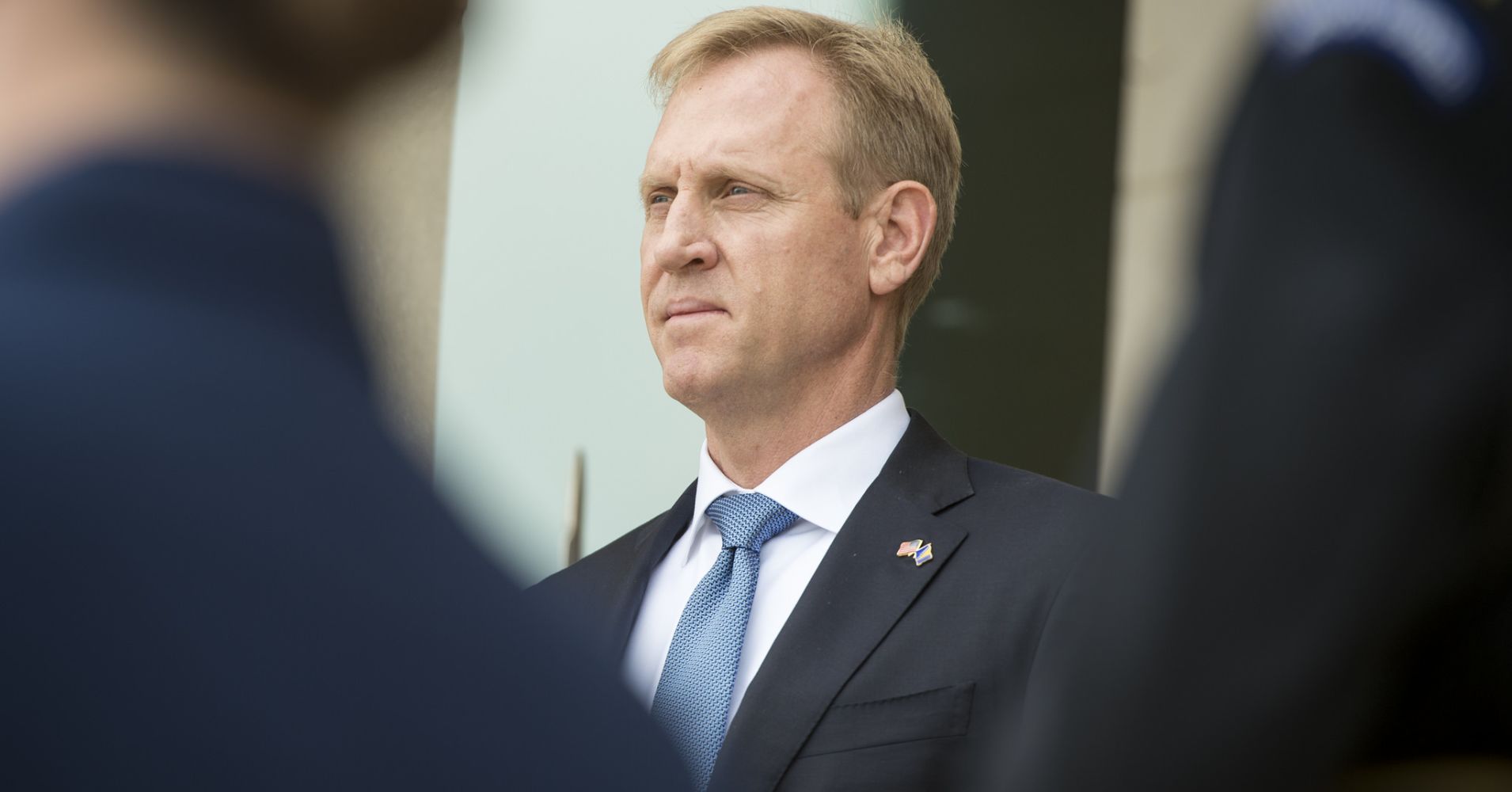
WASHINGTON — From his firm handshake, precise manner of speaking and efficient introductions, it’s clear Patrick Shanahan is a businessman.
Before taking the No.2 spot in the Pentagon, Shanahan spent just over 30 years at one of the nation’s top defense companies. People close to the former Boeing executive say his departure from the highest echelons of the corporate world was motivated by his father, a Vietnam War veteran and Bronze Star recipient.
And so, a little over a year ago, he left the aerospace giant, where he helped developed the 787 Dreamliner, and became the 33rd Deputy Secretary of Defense.
He often describes his job as the Pentagon’s chief operating officer, and his boss, Secretary of Defense James Mattis, as the chief executive officer.
“The secretary has the traditional role of being, you know, like, the CEO, if we were talking in terms of business vernacular. Really, up and out,” he said gesturing the directions with one hand. “And my job is really down and in.”
Shanahan’s comments, which came in an exclusive interview with CNBC a day before Mattis shocked Washington with an abruptly delivered resignation letter, shed light on how the man Trump tapped to become the next head of the Defense Department views his role atop the government’s largest and most lethal bureaucracy.
The former aerospace executive, who maintained an admittedly low profile at the Defense Department until recently, will take the Pentagon’s top job next month as acting secretary of Defense.
After a career in which he rose to oversee Boeing’s supply chain operations as a senior vice president, Shanahan’s new task is more formidable. He will be asked to run a department whose appropriations next year are seven times larger than Boeing’s annual revenue. And he will begin in his new role at a moment of tumult and uncertainty in Washington.
His ascension comes as Trump has pulled the United States back from global commitments and pushed forward on ambitious projects like the denuclearization of North Korea, unsettling allies as well as experts, and raising the specter of a new international balance of power.
The unusual nature of the Trump presidency proved to be too much for Shanahan’s predecessor. In his resignation letter, Mattis said that disagreements with the president about America’s treatment of both allies and strategic competitors came from beliefs that “are strongly held and informed by over four decades of immersion in these issues.”
Mattis, a revered Marine with a military career spanning four decades, was known for his battlefield prowess and kinship with rank-and-file servicemembers. Before he became Trump’s Defense secretary, the four-star general led the U.S. Central Command, the combat command responsible for the wars in Iraq and Afghanistan.
In contrast, Shanahan comes to the role with no experience either in the military or in foreign policy, except for his work in the Trump administration. What views he does have on America’s role in the world have been shaped by his decades in the private sector.
His favorite book, he says, is Freedom’s Forge, a celebration of private industry’s contribution to the World War II effort written by the conservative popular historian Arthur Herman.
“I like that book because it shows what American industry and American government can do when you mix the two,” added Shanahan, who earned advanced business and engineering degrees from MIT. Any “artificial barrier,” he said, is a recipe for delay and added costs.
Shanahan is not the first Trump appointee to take his cues from the business world and apply them to foreign policy.
Trump himself lacked experience in government, and campaigned on running Washington based on the lessons he learned running the Trump Organization and promoted as a reality show host on The Apprentice.
Trump’s first Secretary of State, Rex Tillerson, entered the public sector after serving as CEO of ExxonMobil. The administration has touted the fact that the official leading the administration’s negotiations with North Korea is a former Ford executive. But despite Tillerson’s efforts to streamline the State Department, Trump pushed him out and would later say he was “dumb as a rock and I couldn’t get rid of him fast enough.”
“Privately, he feels the department is not single threaded and tied to one person,” a defense official close to Shanahan’s office said in the wake of the announcement.
“The Department of Defense is a great institution with remarkable talent and he is going to rely on that talent for counsel, experience and expertise,” the official added insisting on anonymity to speak candidly.
“So, I have one of the better views in the building,” said Shanahan, dressed in a crisp navy blue suit as he walked into his spacious office. “On a clear day, and when the trees don’t have their leaves, you can even see the White House,” he adds.
He sat at a small polished conference table. There’s another larger conference table, two maps, a sitting area and a clutter-free desk in the room. The walls of his third-floor office lack the usual commemorative plaques, framed medals, and challenge coin displays that are typically found within the building.
The only notable photograph is of his father in a service uniform, which he brings to the table along with a manila envelope.
“My mom sent me some photos,” he said placing the black and white images on the table. While his professional experience is in the private sector, Shanahan notes the impact of his father’s military service in Vietnam.
“My dad never spent any time in business. He was in the military and then he was in law enforcement. So I was like, I’m going to go into business,” he added with a laugh. “I grew up in a family of service and of course I didn’t do any … but when Secretary Mattis called up and he said, ‘Hey, I need you to come help. It was easy,” he explained.
“I have a front-row seat on the world,” he said of his job.
More than a year into the job, Shanahan discussed milestones, setbacks, misconceptions, and his work overseeing the Pentagon’s colossal $700 billion budget at a time when threats abound abound in the air and in space, on land and at sea.
“It’s the biggest budget in the government … over half the discretionary spending of the U.S. government,” he said, settling back into his seat. “So, as you can imagine, putting something like that together takes the better part of nine or 10 months and then the budget itself isn’t just a one-year budget, it’s a five-year plan,” he added.
“And it’s a not an exercise in just taking inputs and then adding them all up. It’s an exercise that says, ‘If we spend the money on these things, will we be able to have a certain level of readiness? Will we be able to field new technology that works on a timely basis? Will we spend money in the right areas to recruit and retain an all-volunteer military?'” he said.
Even though funding was secured for the upcoming year, Shanahan, with an eye on the future, began building the next budget request for fiscal year 2020.
“Now is the time to make choices about what we will and won’t do. Those choices, as reflected in this budget, will determine what our military looks like for the next 50 years and we’ve got 10 weeks to complete it,” he said during his remarks at the Air Force Association’s annual conference in September.
“We live in an era of great power competition. That’s a muscle we haven’t used in a while,” Shanahan added.
The two countries that the Trump administration has repeatedly singled out as posing the gravest threats to American strategic dominance, Russia and China, have been observing what the U.S. has been doing in its wars for the last several decades. And those two competitors can’t be dealt with as if they are the same threat, he said.
“It’s a competition but they’re different competitors,” he said. “And to win and dominate is going to take a different set of capabilities with each.”
It’s not clear how long Shanahan will hold his new role — Trump, in Iraq this week, said it could be “for a long time.”
And it’s an open question if Shanahan, who is so different in his professional life from Mattis, will have any easier of a time dealing with the president.
Personally, the two men share some common ground. Both Mattis and Shanahan are early risers, up by 4:30 a.m. They are both from Washington state. And they both work weekends.
What’s more, the two are known to compete over who arrives first to the Pentagon.
“He always beats me,” Shanahan said.
CNBC’s Tucker Higgins contributed to this report.

